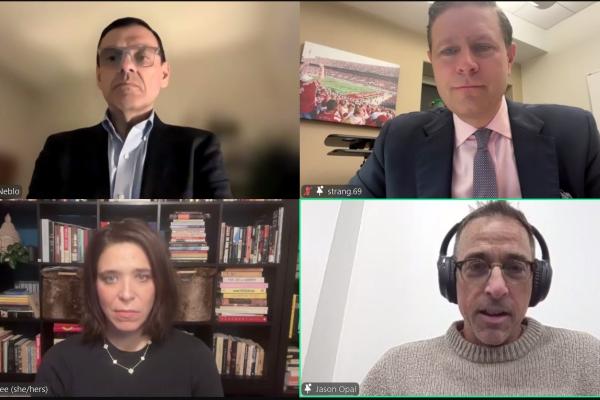Back to Being Buckeyes After the Election – Working Through AOur Outrage

On November 4th, the Institute for Democratic Engagement and Accountability (IDEA) at Ohio State University, in collaboration with the Salmon P. Chase Center for Civics, Culture, Society and Listen. Learn. Discuss., hosted an event titled Back to Being Buckeyes After the Election, Working Through Our Outrage. The gathering aimed to guide students and community members from the intensity of the election season toward a focus on governance, unity, and constructive civic engagement.
More than 100 participants attended, with 65 individuals joining online, while the remainder gathered in designated hubs across the campus where refreshments were provided. The panelists included Dr. Michael Neblo, Director of IDEA, Professor Lee Strang, Executive Director of the Salmon P. Chase Center, Dean Jason Opal, Director of The Ohio State University at Mansfield, and Amy Lee, Associate Director of IDEA and a graduate student at the John Glenn College of Public Affairs. President Bobby McAlpine, President of the Undergraduate Student Government, had also planned to participate but had a late-emerging time conflict.
Dr. Michael Neblo opened the event with remarks emphasizing the importance of moving from campaigning to governing.
"We have the power to choose a different way," Neblo stated. "We can be passionate and partisan during the campaign, democracy thrives on that passionbut once the votes are counted, we must focus on governance. Democracy requires us to find ways to work together constructively, even when we disagree."
Professor Lee Strang spoke on the importance of civic virtues in building a harmonious community.
"We must embrace civic friendship, a concept rooted in Aristotle's philosophy, where we treat each other as fellow community members, even when we have profound disagreements," he explained. "It's about engaging thoughtfully and respectfully to keep the spirit of our democratic project alive."
Dean Jason Opal offered a historical perspective on the significance of the current moment.
"These next 24 to 48 hours will likely be remembered in American history," Opal remarked. "I've studied American history for years, and while our political discourse can often be exaggerated, this moment feels genuinely important. We're at a point where we need to come together and find common ground. History teaches us resilience, and we can draw from past lessons to navigate this time."
Opal shared a meaningful historical anecdote:
"During the English Civil War, some American colonists found a way to manage deep divisions by creating rules to humanize each other, like hosting meals for neighbors if political arguments got out of hand. Today, we can learn from that wisdom by seeing each other as neighbors first, not just political adversaries."
Amy Lee concluded the panel remarks with a compelling message about the role and responsibility of students in promoting unity.
"We've seen a lot of division and misinformation over the past few years," Lee acknowledged. "There's a heightened sense of concern and mistrust. It's easy to feel overwhelmed. But what gives me hope is seeing so many of you here tonight, eager to engage and learn how to make a positive impact. We have a unique opportunity, and responsibility, as students to bridge these divides."
She stressed the importance of active participation and critical thinking.
"We can't afford to be passive. We need to engage with reliable sources, verify information, and push back against misinformation in our own circles. It's also about understanding that many people feel disconnected or powerless. We have to use our education and resources to support and uplift our communities, acting as bridges rather than creating further divides."
The event shifted to breakout discussions, encouraging participants to find common ground and actionable solutions. The group conversations focused on strategies for healing relationships strained by political differences and encouraged active participation in the community. A recurring theme was the need to move away from a 'permanent campaign' mindset and adopt an approach centered on governance and community problem-solving, as well as how to contribute positively to their communities.
The evening concluded with a debrief and a final live poll, summarizing key insights and reinforcing the commitment to ongoing civic dialogue.
